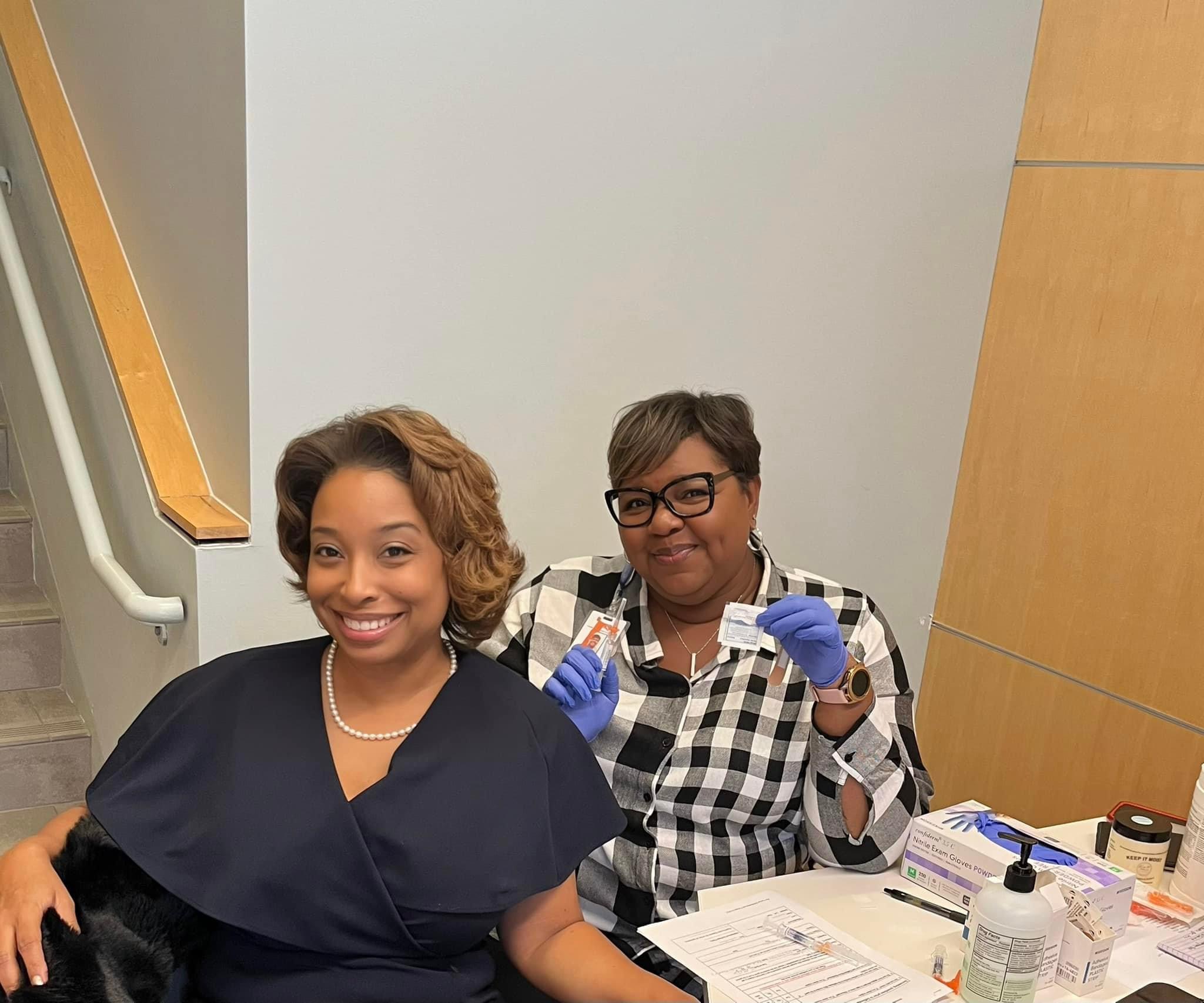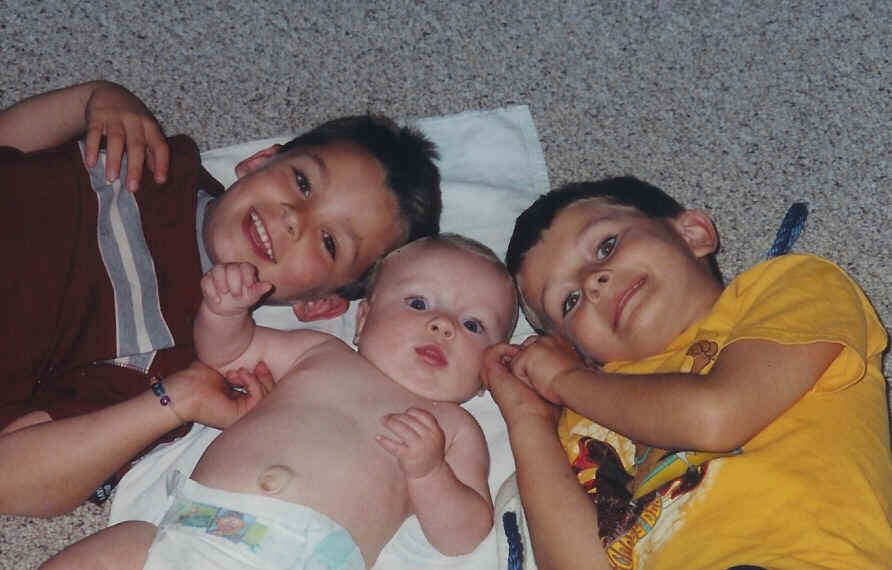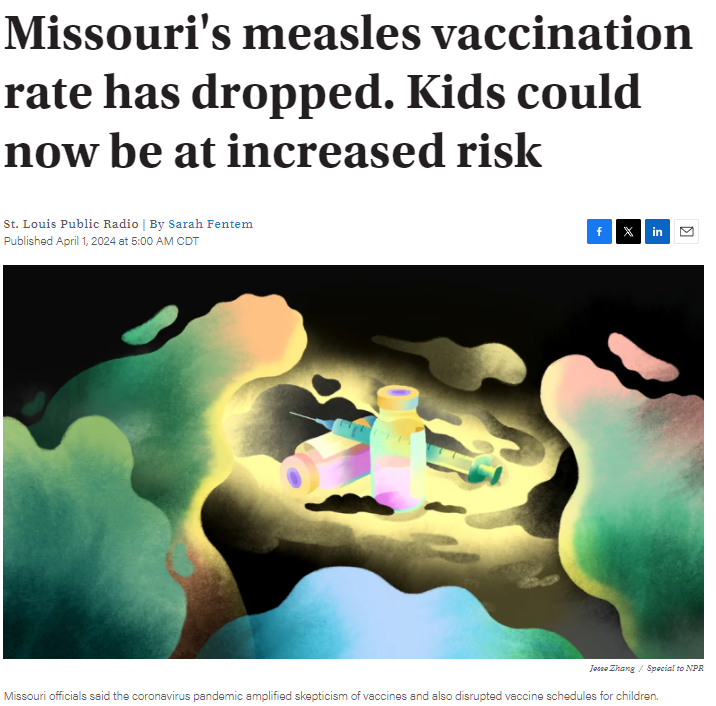In a world continually grappling with health challenges, the influenza vaccine emerges as a crucial defender against a relentless adversary—the flu virus. “As winter approaches, health experts, backed by comprehensive data from the Centers for Disease Control and Prevention (CDC), emphasize the importance of vaccination as a powerful tool to safeguard individuals and communities alike,” said Nicole Cope, Missouri Immunization Coalition’s Executive Director.

Dr. Kendra Holmes getting vaccinated against flu.
The effectiveness of the influenza vaccine is underscored by recent statistics from the CDC, highlighting its significant impact on preventing illness and reducing the severity of symptoms. According to the latest data, the vaccine reduces the risk of influenza-related medical visits by 40-60%. During the 2022-2023 flu season, it prevented millions of illnesses, thousands of hospitalizations, and a substantial number of flu-related deaths. According to the CDC, “Everyone 6 months and older in the United States should get an influenza (flu) vaccine every season with rare exception.”
Dr. Kendra Holmes, President and CEO of Affinia Healthcare and member of the Missouri Immunization Coalition, serves as a guiding light in the crusade for influenza vaccination. Addressing prevalent misconceptions, Dr. Holmes emphatically states, “The influenza vaccine cannot give you the flu. You may experience what you think are flu-like symptoms, but again, that is just proof that the flu vaccine is working.” This clarification is pivotal in dispelling fears and fostering trust in the vaccine.
However, Holmes acknowledges the challenges of vaccine hesitancy, drawing parallels between the hesitancy surrounding COVID-19 vaccines and that of the flu vaccine. “We talk about hesitancy for COVID vaccines; we have just as much hesitancy for the flu vaccine, if not more,” she remarks, shedding light on the uphill battle in convincing people of the safety and efficacy of influenza vaccination.

Charles Hinderliter, a Flu Survivor and True Inspiration
Dr. Holmes directs a compelling message towards expectant mothers, stating, “We highly, highly encourage pregnant moms to be vaccinated with the influenza vaccine. It provides additional protection not just for mom but also for the baby.” This emphasis on protecting the vulnerable extends to all community members, regardless of age or health status.
Charlie Hinderliter, a 44-year-old survivor of influenza from St. Louis, Missouri, shares a harrowing personal experience that underscores the lasting impact of influenza. In 2018, he nearly lost his life to the flu. His tweet from October 13, 2023, serves as a powerful reminder, “This week, I got my flu shot, and I encourage you to do the same. In 2018, I nearly died from the flu. I spent a week and a half in a coma, two months in the hospital, and three weeks living in the same nursing home as my grandma.”
Charlie candidly admits he never remembers getting a flu shot before his near-death experience. At the age of 38, he believed the vaccine was only for the young or elderly. His perception changed drastically as he spent weeks battling the aftermath of the flu. Today, at age 44, Charlie advocates fervently for others to get vaccinated, driven by both physical and emotional scars that will be with him forever.
Influenza does not discriminate, affecting everyone from healthy adults to healthy infants. In December 2003, signs of illness appeared in 6½-month-old Ian Moise. Following a morning nap, Ian vomited, prompting his parents, Julie and Glenn Moise, to seek advice from the pediatrician. Initially diagnosed with the flu, they were advised to schedule a follow-up if Ian’s condition did not improve. As the day progressed, Ian’s breathing became strained, and his temperature rose. Concerned, his parents took him to a specialized urgent care facility for children, where he tested negative for respiratory syncytial virus (RSV) but positive for influenza. The doctor recommended symptom treatment, with follow-up if no improvement was observed within 48 hours.

Sean (left) and Ryan (right) Moise Snuggle with Their Brother, Ian
Despite some apparent improvement during the night, with eased breathing and a lower temperature, Ian’s health took a tragic turn on a Wednesday afternoon. He went into respiratory arrest, leading to CPR administration and immediate transportation to the hospital. Despite the dedicated efforts of the medical team, Ian succumbed to complications from Influenza A on December 17, 2003, just 30 hours after displaying his first symptom of illness. Notably, Ian and his two older brothers, Sean and Ryan, had received the first of two doses* of the influenza vaccine two weeks before Ian fell ill. “…it is important for all people to get vaccinated against the flu. Not only does it protect the person getting vaccinated, but it helps to protect our loved ones and people that we are around. My husband and I did not get vaccinated, and we both tested positive for the flu within hours and days of losing Ian. We can’t help but wonder if we gave Ian the flu,” said Julie Moise, Ian’s mother.
In memory of Ian, the Moise family has established Ian’s Rainbow Flu Foundation, dedicated to raising awareness about the severity of influenza.

Sean (left), Faith (middle), and Ryan (right) Moise next to a picture of their brother Ian at the Ian’s Rainbow Flu Foundation’s annual “Walking to Fight the Flu” event in 2015.
These intertwined stories form a tapestry of urgency and responsibility—a call to action echoing from the voices of survivors, health advocates, and grieving parents. Dr. Holmes emphasizes, “Even if you’re a healthy person, you need to be vaccinated. A lot of people don’t know what underlying conditions they may have.” This clarion call transcends individual concerns and urges a collective commitment to community health.
“The call to action is clear—vaccination is not just a choice; it’s a responsibility, a commitment to personal health, and a pledge to protect the health of those around us,” said Nicole Cope.
* CDC says, “Children 6 months through 8 years of age may need two doses during a single flu season. Everyone else needs only one dose each flu season. It takes about two weeks for protection to develop after vaccination.”
Published December 6, 2023




